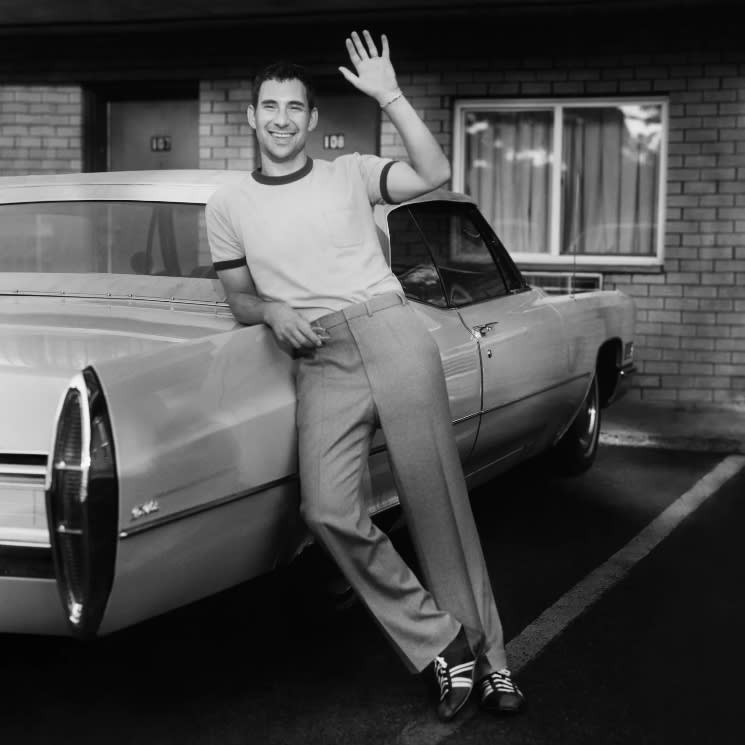Over more than a decade of working his way into the heart of modern pop music, Jack Antonoff has managed to cement himself as a household name. With four studio albums as Bleachers and frequent collaborations with Lorde, St. Vincent, Taylor Swift, Lana Del Rey and more, Antonoff has become one of the most sought-after producers in the game, his glitzy production and evidently agreeable collaborative approach making him the go-to for cathartic, heart-on-sleeve pop. One of Antonoff’s most recent projects, Lana Del Rey’s Did you know that there’s a tunnel under Ocean Blvd, drips with sultry radiance, even nabbing a Grammy nomination for Album of the Year. Obviously Antonoff is doing something right, having found his niche and rather quickly expanded it to encompass the sound of modern popular music.
However, in a music industry filled to the brim with Antonoff’s well-recognizable musical language, it can be hard to feel excited for a new Bleachers record. To say that some listeners have come down with a case of Antonoff-fatigue wouldn’t be out of pocket — listening to any new song by pop’s main girls can feel like a game of “Where’s Jack” (Antonoff even cheekily refers to himself as a “pop music hoarder” on Bleachers’ “Modern Girl”). Antonoff’s production is easily identifiable by his trademark, and now predictable, quirks — saxophone licks, ‘80s-inspired synths, walloping drums, a bubbling, building undercurrent that buzzes like a live wire. Hearing these stylistic tics on Antonoff’s first few records as Bleachers was exciting, but at this point his quirks are less quirky, the surprises less surprising; it’s all begun to blend together in a Jersey flag-yellow haze.
Reflection, loss and love are all themes that Antonoff explores on Bleachers, just as they were on the previous three. His sound continues to pay homage to his influences, including fellow New Jersey boy and Antonoff Godhead Bruce Springsteen, who actually appeared on Take the Sadness Out of Saturday Night’s “Chinatown.” As if the National and Springsteen had a navel-gazing lovechild, Bleachers pares down the bombast of Antonoff’s prior solo records just slightly, opting for a record filled with slower songs that drag down the bustling energy that he first introduced on lead single “Modern Girl,” which becomes marooned between tracks that fail to bring the heat.
For a self-titled record, these songs are surprisingly indistinct — most could be easily removed and placed in the context of any previous Bleachers record without raising any eyebrows. One would hope that this far into Antonoff’s career as a solo artist there would be some variation, but Bleachers fails to capture the magic of Antonoff’s career highlights, highlights that are so often found in his non-Bleachers work. The lows on Bleachers are too low and the highs never quite reach the peaks of his previous outings, circling already-explored ideas with a surprising timidity.
Bleachers begins with the wide-eyed “I Am Right on Time” as Antonoff stumbles into this fourth album. The song continually build over its three-and-a-half-minute runtime to little effect, a shaken bottle of soda that never fully explodes. “Modern Girl” on the other hand is a Bleachers classic — a bright, confident drumbeat propelling it forward, lifted by addictive saxophone licks and a genuine sense of joy and abandon. It’s a shame that Antonoff is unable to harness that energy again.
“Alma Mater” is a husky, whiskey-smooth track that features Lana Del Rey, while “Isimo” bubbles with sentimentality, a nostalgic, serene ode to making it out. It’s on “Self Respect” that things start to go south — a point of introspection, Antonoff reflects on past regrets, backed by vocals from Florence Welch and coupled with a shimmering undercurrent not dissimilar to the Antonoff-produced tracks on Taylor Swift’s Midnights. The song also features some bizarre lyrics that reference Kobe Bryant’s death and Kendall Jenner’s infamous Pepsi ad, with Antonoff using them as signposts to remember the day he “held her last.” It’s as perplexing and clumsy as it sounds, especially as it slams up against the song’s pleading chorus: “I’m on my hands and knees begging you to kiss me / When I’m not around, do you even miss me?”
Bleachers drags its way to the finish line with “The Waiter,” a reverb-heavy track that can't conceal the clunky lyrics within: “So when you cry like you do, you still know what you ignored / You can cry what you want, but the floor’s still the floor.” What should be a heart-stirring finale instead sputters under the weight of its own words — “The Waiter” will likely leave you ready for the bill.
Bleachers is agreeable and safe, but there's a fumbling listlessness to the whole thing, a lack of dynamism that makes it fade into white noise. Antonoff’s latest is not the grand, drive-off-into-the-sun record that Strange Desire or even Gone Now strove to be and sometimes became — Bleachers is a commuter’s record through and through.
